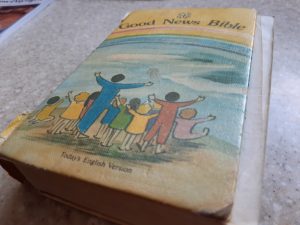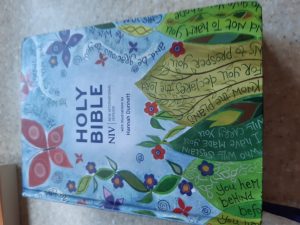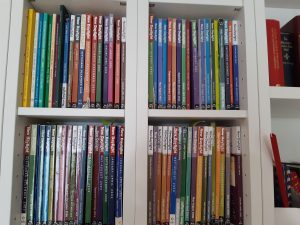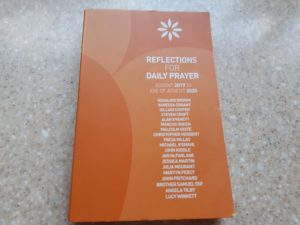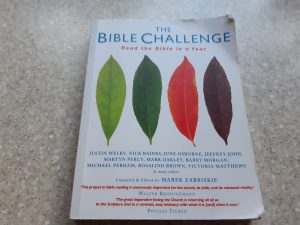Advent 3 – Isaiah 61: 1-4, 8-end and John 1: 6-8, 19-28
Link to the video of this reflection: https://youtu.be/-mhkKKMEzqE
I often think these days that the current younger generation will be much more patient and able to deal with waiting than people of my age. We all grew up with electricity, but whereas I am used to gadgets that switch on when I push the switch, modern electronics take time to get started. I can write down a phone number in a matter of seconds, but if I want to save it to my phone or computer, then I have to wait for it to boot up and for the application I want to open before I can actually make the note.
When John started preaching, the Jewish people had been without a prophet for some 400 years since the time of Malachi. What we don’t know is whether they had grown tired of waiting or were looking for a prophet to bring them fresh word from God. Whatever the answer, they would definitely have been surprised and excited by the appearance of John, and the religious authorities who had been keeping things going in the meantime were quick to want to check him out. John, however does not seem inclined to give them any useful answers, as he is only willing in the account we heard read today to tell them who he is not. If you read on in this chapter you will read John’s testimony concerning Jesus, and his account of Jesus’ baptism. John is very clear about his purpose – he is to prepare the way for Jesus by preaching repentance of sin and baptism, and when that is done, he is to fade into the background.
Is there a lesson for us here? More than once in our bibles we read accounts of people approaching the disciples and asking in various ways to see Jesus. Nobody seemed terribly anxious to see Peter or Andrew or James – and nowadays the world does not really need to see Penny or Alison or you either – although they may not entirely realise it, they want to see Jesus still. John is a good role model for us all here.
I sometimes wonder if the Roman emperor Constantine did the Christian church any favours when he made it the official religion of the empire. He certainly enlarged it massively at a stroke by enrolling his entire army, but the long-term effects have been to make our faith respectable and this is not always healthy. I have read that St Benedict who lived in about 500AD was amazed when sent to Rome to be educated by the number of churches that had been and were still being built. We do love our buildings! And yes – I love this church at Pen Selwood too. But do our churches distract from our message? For five months of this year, our church buildings have been closed to public worship – for three of those months the buildings were completely shut and locked and even now access to them is very limited. Do we feel that God went away in that time? Did we say with the exiled people of Israel – ‘how can we sing the Lord’s song in a strange land’? We learned new ways – developed new skills, perhaps our church life will one day return to its former structure, but I rather hope it doesn’t. Change is never comfortable, and I am sure we would not have changed greatly in this year, but it has been forced upon us. Once again I remember the comment that someone put into our Vision Survey in 2018 – Whilst we all love the comfortable old, we would like to embrace the exciting new. During lockdown earlier this year we heard a lot of talk about the new normal, as people learned different, new and often better ways of doing those things that they weren’t able to carry on in the normal way.
I wonder if we ever consider these days quite how counter cultural Jesus and John the Baptist were in their day. Without going into the rights and wrongs, I wonder how much difference there really is between turning over tables in the temple court and pulling down a statue in Bristol. Some things cause deep offence to some people, and if you want your protest to be noticed, sometimes you have to upset people – whether by blocking the traffic in London, removing a statue in Bristol or returning large quantities of unwanted plastic to the shop that insisted on packaging everything.
Our reading from Isaiah gives us a good steer of what God is actually looking for in his kingdom. Jesus read some of these verses in the synagogue at Nazareth at the beginning of his ministry:
‘The spirit of the Lord God is upon me, because the Lord has anointed me;
he has sent me to bring good news to the oppressed, to bind up the broken-hearted,
to proclaim liberty to the captives, and release to the prisoners; to proclaim the year of the Lord’s favour,’. The result of his preaching that day was to be thrown out of the synagogue, and almost off a cliff.
If you use email then I expect that you, like me receive several emails daily from charities in desperate need of funding. Television advertising is heart breaking to watch, and our news recently has been full of the campaign of Marcus Rashford for children to receive the free meals at home that they are given when at school. We are about the 5th richest country in the world, and still there are children going hungry. We pride ourselves on being open, welcoming and tolerant, and yet people in positions of power and authority are still being investigated, and inquiries show that many of our establishments are still institutionally racist. In the last week, 25,000 people have learned that they will probably be made redundant – and they are only a part of the damage that has been done this year. Charities that give advice and help with debt problems have never been busier, and the Trussell Trust, that runs many of our food banks tells me that they are expecting to give out a food parcel every 9 seconds this winter. I also know that people are wonderfully generous. Last month the Children in Need appeal raised the amazing sum of £41m. By now it is probably more than that, but I also know that next year they will be looking for more. Where did we go wrong?
Before you start looking for a handy cliff, I should stress that I am not seeking to blame anyone for these things – for once I am not even blaming the government! But there must be more that we can do. Each one of these people in need is made in the image of God, and deeply loved by Him. I know that many of the problems of the last year have been caused by the pandemic – but I also believe that many of them were accidents waiting to happen – it just took the push of a virus to set the dominoes falling. We have much to be thankful for. We live in a beautiful part of a country where we are free to worship, where we are free to call out our leaders when we see shortcomings. Where the intention of the welfare state is that no-one should fall through the cracks and have nothing – it is not perfect, but it is at least trying.
We cannot escape the fact though that our churches are becoming emptier – and not just at the moment because people fear infection. There must be something that we are not getting right – and I wonder if it is because our lovely stone walls prevent people from seeing that what they need and really want is to see Jesus. We look respectable, comfortable – but should we look loving? Should we take a leaf out of John’s book and point out that we are not, and don’t have the answer – but we do know, and can point to the one who does?







